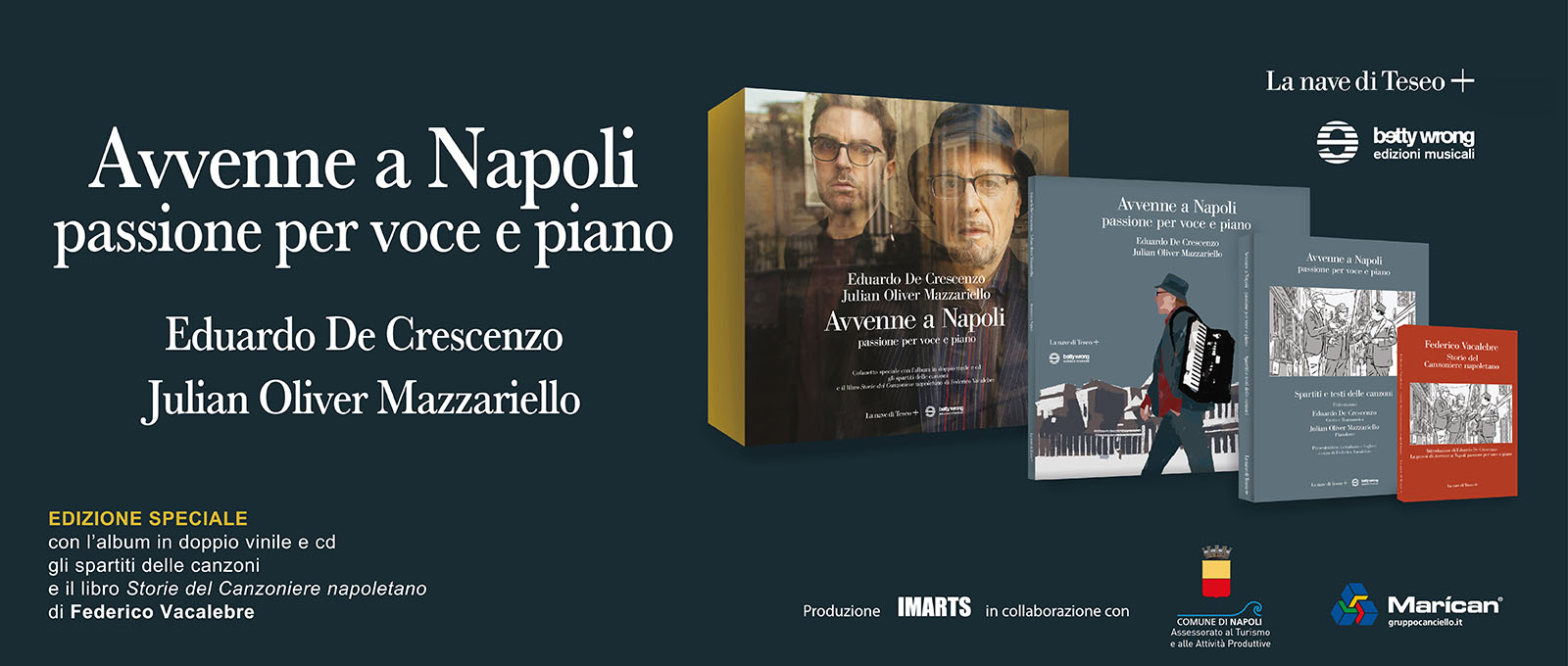AVVENNE A NAPOLI passione per voce e piano SPECIAL EDITION
The release contains: the double vinyl and the CD with 20 of the most evocative songs of the repertoire; the book “Storie del Canzoniere Napoletano” by Federico Vacalebre; the music scores of the songs performed and elaborated by Eduardo De Crescenzo singing and accordion and Julian Oliver Mazzariello piano; the preface in Italian and English by Federico Vacalebre.
On December 12 at 6:00 p.m. Eduardo De Crescenzo and Julian Oliver Mazzariello present Avvenne a Napoli at an emblematic place for the repertoire: the Conservatory of San Pietro a Majella. The presentation will be followed by a concert by the artists. Introduced by Federico Vacalebre. The project published in CD version in May 2022 together with Federico Vacalebre’s book, “Storie del Canzoniere Napoletano “, is now enriched with the double vinyl version and the music scores with the elaborations of Eduardo singing and accordion and Julian piano and reveals with greater clarity the informative and didactic character of the entire project. “La Canzone”, freed from oleographs and stereotypes, from lying stories, is a precious heritage to be brought back to concert halls, to the great classical music festivals, to be proposed to UNESCO as an intangible heritage of humanity. Like flamenco, lied… it is the expression of a magical time, of a very noble Naples that knew how to make art the center of the heart and was sung by the whole world.
The imaginary journey begins around 1800, with Julian’s parachopin-like introduction to “Fenesta vascia” sublimated by a breathtaking interpretation by Eduardo who in a flash frees the song from the crusts of time, from the thousand often senseless remakes that still afflict the repertoire. Together they cross more than a century of music, following the imagined sounds of the time. We are in 1950, it will still be a worldwide Neapolitan success, but the music is already in a beguine style contaminated by African-American sounds. It is so contaminated that Eduardo and Julian interpret it, take advantage of it to re-enter the shoes of the blues man and the jazz musician, in the music to which they themselves belong and mark the end of the journey.
In between, the golden age of singing Naples, the song of art and people, of musicians and poets, master composers and anonymous “whistlers”.
THE ALBUM “AVVENNE A NAPOLI passione per voce e piano”, on CD and DOUBLE VINYL: the iconic voice of Eduardo De Crescenzo and the eurocentric piano of Julian Oliver Mazzariello, interpret twenty great Neapolitan classics. They retrace the prestigious “Canzoniere” from its beginnings, around 1800, until 1950 when, with the landing of the American allies, jazz arrived in Italy and music changed forever. A magical and talented artistic work but also of historical and musical research. He is looking for “the lost sound”, Eduardo, the sound that the Neapolitan Song must have had in its time, before it was overwhelmed by a thousand senseless remakes, by a thousand cultural misunderstandings.
In the BOOK “Storie del Canzoniere Napoletano”, Federico Vacalebre recounts the musical, cultural, but also historical, political and social moods that determined the glory and fall of an artistic phenomenon that still identifies, together with the Opera, Italian music in the world. The book opens with an evocative essay by Eduardo De Crescenzo that describes the genesis and motivations of the project.
The MUSIC SCORES of the twenty songs performed and elaborated by Eduardo De Crescenzo singing and accordion and Julian Oliver Mazzariello piano with a preface in italian and english by Federico Vacalebre, to underline the internationality of the Italian repertoire, together with the Opera, the most famous in the world.


